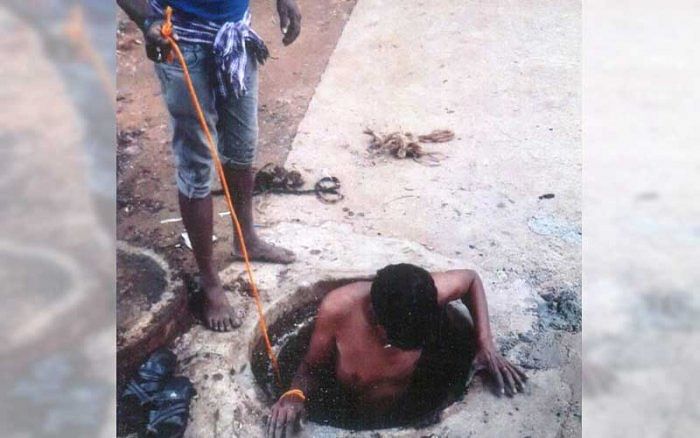At least 50 persons have died cleaning sewers in the first six months of 2019 alone, according to data collated by the National Commission for Safai Karamcharis (NCSK).
This NCSK data, by their own admission, underscores the problem as it covers the number of deaths caused by cleaning sewers in only eight states -- Uttar Pradesh, Haryana, Delhi, Punjab, Gujarat, Maharashtra, Karnataka and Tamil Nadu -- out of the 36 states and Union territories.
The NCSK is also doubtful about the data for the aforementioned states being accurate, the Indian Express reported.
In the annual report that the NCSK submitted to the parliament, the commission noted the Swachh Bharat Abhiyan “should not focus just on toilet building but also on eradication of manual scavenging or workers’ rehabilitation”. The report also identified the Indian Railways as the “largest employer of safai karamcharis”.
The latest info follows another key revelation made in the Lok Sabha on 9th July when the Union Ministry of Social Justice and Empowerment admitted that there have been no reports from states or union territories of people being convicted for employing manual scavengers, since it was outlawed in 1993 (Employment of Manual Scavengers and Construction of Dry. Latrines (Prohibition) Act) and again in 2013 (Prohibition of Employment as Manual Scavengers and their Rehabilitation Act).
Manual scavenging is a term used for the manual removal of untreated human excreta. The practice is prohibited by law.
Responding to a question by Vishnu Dayal Ram, the Minister of State for Social Justice and Empowerment, Ramdas Athawale, said that while 53,398 manual scavengers have been identified across the country, “there have been no reports from any State/Union Territory regarding conviction in such cases.”
A separate list of questions was put forth by AIMIM Chief Asaduddin Owaisi and fellow party member Imtiaz Jaleel on the government data regarding the number of active manual scavengers in the country. Athawale, in a written response, listed down a state-wise break-up of the number of deaths identified or reported in sewers/septic tanks from 1993 to June 2019.
The list, which covered 15 states, revealed that 620 such deaths were reported, with Tamil Nadu topping the list with 144 identified deaths. Gujarat, with 131 deaths, stood second while Karnataka, with 75 deaths, took the third spot.
In the past three years alone, 88 deaths were recorded and most of them were brought to the Department’s notice through press reports. The response further revealed that out of the 620 deaths, 445 such cases had been fully compensated (Rs 10 lakh each). 117 still await compensation.
DH also reported in May that while about 100 manual scavenging deaths were recorded in the state since 2008, not even one has resulted in a conviction. In February, DH reported that a pilot survey of six of Karnataka’s 30 districts had found 1,720 manual scavengers. The state-wide figures are likely to be five times larger.
